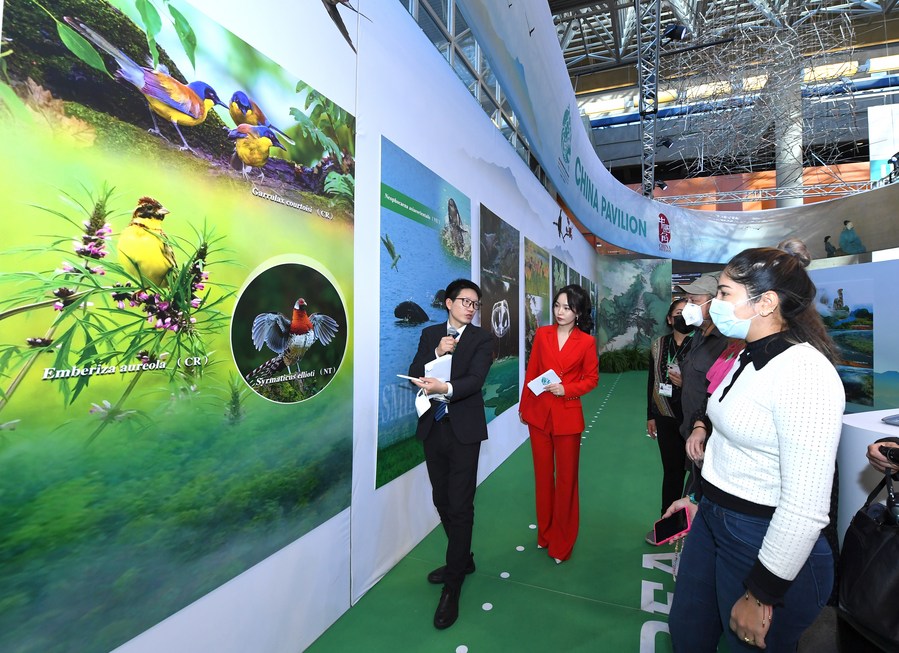
People strolling on a viaduct of Jinjishan Park in Fuzhou, southeast China's Fujian Province, March 16, 2021. (Photos: Xinhua)
Global environmental governance reached a crossroads as climate change, biodiversity losses and ocean pollution pose direct threats to the ecosystem and human wellbeing, affecting food, health and security, the global priority continues to be shifted to ramping up fossil fuel production, amid sharply rising geo-political tensions, to secure supply for post-pandemic economic recoveries.
Breaking this impasse needs both visionary thinking and creative solutions. As the second largest economy in the world, China's pursuit of ecological civilization has naturally caught the attention of the world.
Ecological civilization contains a broad and profound theory. It means building a new form of civilization that enables man and nature to coexist harmoniously. Recognizing that the earth is so far the only planet in the known universe that has life and that nature itself is fundamental for the entire humanity to live and to prosper, eco-civilization calls for respecting, adapting to and protecting nature in any social-economic development.
Eco-civilization has its roots in rich ancient Chinese philosophy and culture, such as Confucianism, Taoism, and Buddhism, which advocate balance, moderation and respect for nature. It also draws inspiration from modern environmental theories and practices, such as sustainability, inclusive development, circular economy and low-carbon transition.
Eco-civilization is not only a concept. To put it into practice, eco-civilization was written into China's constitution in 2018. Following its guidance, China launched massive clean air and clean water action plans, by building tens of thousands of monitoring stations across the country and vastly strengthening environmental enforcement.Besides, China achieved a great improvement in air quality in the world, with Beijing's PM2.5 concentration dropping by 66.5 percent from 2013 to 2022.
Also last year, China's GDP topped 120 trillion Chinese yuan($17.24 trillion). China's economic development has achieved tremendous success and provided by far a major contribution to global economic growth, which boosts confidence for China to pursue concerted efforts to cut carbon emissions, reduce pollution, expand green development and pursue higher-quality economic growth.

Participants visit the China Pavilion during the second phase of the 15th meeting of the Conference of the Parties to the UN Convention on Biological Diversity (COP15) in Montreal, Canada, December 10, 2022.
China's ecological concept and practices could help create innovative solutions to address global challenges. At the international level, China has actively participated in global environmental governance and cooperation. To tackle climate change, China has ratified the Paris Agreement, building the world's largest solar and wind power capacity, and cut its carbon intensity by more than one-third and the share of coal in primary energy consumption dropped from 68.5 percent to 56 percent in the past 10 years. China has committed to peak its carbon dioxide emissions by 2030 and achieve carbon neutrality by 2060.
To address biodiversity losses, China hosted the United Nations Biodiversity Conference (COP15) in 2022 and made a great contribution to ensure its success. Biodiversity draws increasingly greater attention from the international community as it is under serious threat globally. With the world population more than doubling and global GDP growing from $3.4 trillion in 1970 to $85.3 trillion by 2020, nature has suffered enormous losses in half a century as the global population of mammals, birds, amphibians, reptiles and fish declining by two-thirds on average, concluded by the Living Planet Report 2020.
As the host country of COP15, China played a pivotal role in the signing of the Kunming-Montreal Global Biodiversity Framework (GBF). It was considered a historic moment in global biodiversity governance when all parties commits to achieve 23 targets by 2030 to address biodiversity loss, restore ecosystems and protect indigenous rights.
China's own conservation efforts help build trust for it to play such a leadership role in COP15. It has designated 25 percent of its land territory "ecological red line" zones, which covers ecologically sensitive areas, ecologically vulnerable areas and ecologically functional zones, and curbed the trend of eco-degradation through concrete measures such as a logging ban, returning farmland to forest and grassland, establishing national parks, water pollution control and a fishing ban in the Yangtze basin. These actions and results speak louder than words and attract worldwide attention.
From 2022, China has embarked on a new journey to pursue a Chinese path to modernization, with harmonious coexistence between man and nature an integral part of it. It will help further develop eco-civilization in China's long-term social-economic development. It will also enable China to make more input in global environmental governance and to provide more support to other countries, particularly the global south, in their pursuits of sustainable development and common prosperity for all.


